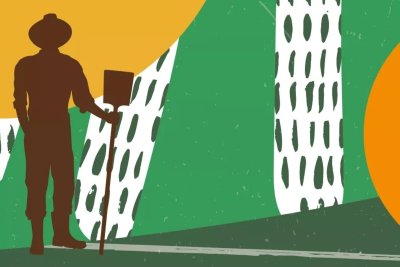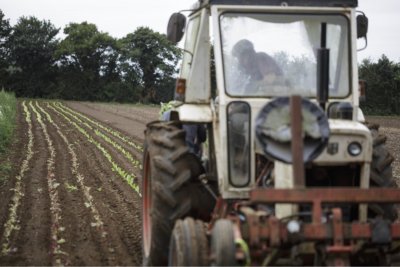News • Sustainable Farming Campaign
Sustain sessions at the Oxford Real Farming Conference, January 2024
Sustain and our project and campaign coordinators organised or contributed to the following events at the ORFC in January 2024. Recordings of some of the sessions are now available, linked to below.

Influencing farm policy in every nation of the UK
Venue: Digital Hub, Cheng Building - Jesus College (Market Street)
Time: Thursday 4th January, 14:00 - 15:30
Chair: Will White (Sustain)
Speakers: Martin Lines (Nature Friendly Farming Network - NFFN), Denise Walton (Peelham Farm), Rhys Evans (NFFN Cymru), Phil Carson (NFFN)
The move away from the EU’s Common Agricultural Policy (CAP) since Brexit has represented a golden opportunity to reinvent agricultural policy for a greener future. Since food and farming policy is devolved, each nation has come up with its own agri-environmental schemes. Whether it be AECS (Agri-Environment Climate Scheme), ELMS (Enviromental Land Management Schemes), SFS (Sustainable Farming Scheme), or EFS (Enviromental Farming Scheme), the core principles remain the same – public money for public goods. The past few years have not been an easy ride, with delays, mistakes and changes to the various schemes. Despite these stumbling blocks, ambitious agri-environmental schemes have the potential to transform our farmed landscape into one which delivers for nature and for farmers. We speak to four farmers across the devolved nations to discuss their viewpoints on the current policy landscape for farming, and look ahead and explore how policy could be improved.
We need to change food retail
Venue: Seminar Room, Cheng Building - Jesus College (Market Street)
Time: Thursday 4th January, 11:00-12:30
Chair: Julia Kirby-Smith (Better Food Traders)
Speakers: Angelina Sanderson Bellamy (University of the West of England), Zosia Walczak (Growing Communities), Rachel Jones (Sustain)
Independent food traders and new routes to market can help us build a more regionalised and resource efficient food system - one where farmers and local economies get a greater share of profits, and where nature and climate-friendly food is prioritised. This session unpicks why we need alternative ways of distributing and selling food, and how we can support their growth through policy and other measures. We will explore the new business models that are emerging and the challenges and opportunities for independent food retailers and wholesalers in 2024.
A market garden renaissance
Chair: Rebecca Laughton (Landworkers Alliance)
Speakers: Barry Ferguson, Julie Brown, Jo Hunt, Jono Hughes
The UK imports 85% of its fruit and 43% of its vegetables. Countries we import from are already experiencing the impacts of climate change, while financial pressures are causing UK growers to leave the sector. Yet, across England, Wales, Scotland and Northern Ireland, market gardens are attracting new entrants, supplying local communities, integrating productive systems with biodiversity, sequestering carbon and engaging with the public.
This session will launch the LWA’s new report ‘Horticulture across Four Nations’, which explores the contribution that agroecological horticulture could make to reducing our reliance on imports and building a more resilient, fresh produce sector. Growers featured in the illustrative case studies in the report will speak about how they are contributing to making this vision a reality, and what their respective governments could do to help.
Cleaning up our rivers
Venue: Digital Hub, Cheng Building - Jesus College (Market Street)
Time: Friday 5th January, 09:00-10:30
Chair: Ruth Westcott (Sustain)
Speakers: Sam Hayward (Sustain), Stephen Ware (Farmer - MM & JE Ware & Sons), Peter Brooks (Independent Researcher), Rebecca Tully (Herefordshire Food Alliance Coordinator)
Industrialised livestock farming is a leading cause of river pollution in the UK, and is a hot topic with voters. The behaviour of sewage companies has grabbed headlines, but we want to turn attention to big agriculture companies who are profiting while overproduction of slurry and manure is destroying wildlife in our rivers. We will discuss the pressure on farmers to intensify, and the policy solutions, and practices on-farm that can turn this around, as well as solutions to stopping factory farming at a local and national level.
Realising the potential of public procurement for supporting local, agroecological farmers
Venue: Digital Hub, Cheng Building - Jesus College (Market Street)
Time: Friday 5th January, 14:00 - 15:30
Chair: Sofia Parente (Sustain)
Speakers: Pearl Costello (Food Sense Wales), Gavin Fletcher (Good Food Leicestershire), Jono Hughes (Horticulturist), Raksha Mistry (Food for Life Leicestershire), Kelly Parsons (University of Cambridge)
This session will highlight the huge potential hidden in public procurement for delivering healthy and sustainable food to communities, creating routes to market for agroecological farmers as well as the role of food partnerships in joining the dots between procurement and other local agendas. The session will kick off with an outline of the opportunities as well as common barriers in sourcing more local and sustainable food in public procurement. It will be followed by case studies illustrating the importance of local infrastructure, building relationships between the public sector and farmers, and the role of programmes such as Food for Life in transforming food culture. Delegates will have the opportunity to respond to the panellists and ask questions from the floor.
Commoning of the city
Venue: Museum of Oxford - Museum Makers Space
Time: Friday 5th January, 11am - 12:30pm
Chair: Bonnie VandeSteeg
Speakers: Dee Woods, Sarah Williams, Richard Lee, Ebany Dohle
This session will look at some urban Commoning projects, how they set up and on what commoning principles, and consider how they can be up-scaled so as to challenge the power of the dominant landowners in the city. There will be discussion about overcoming barriers to commoning related to land access and governance. We will consider how the food growing projects practising commoning can link more closely with housing and environmental campaigners to build a movement that can effectively turn our cities into Commons- for social, ecological and food justice. This session will include voices from Southwark Community Planning Network and Glasgow Food Growing Network.
It's time to get fair about farming
Venue: Parish Centre, Christopher Room
Time: Friday 5th January, 13:00-13:45
Chair: Wicked Leaks
Speakers: Guy-Singh-Watson (Riverford), Will White (Sustain), Vicki Hird (The Wildlife Trusts)
In September, organic veg box company Riverford sent an open letter to the CEOs of Tesco, Sainsbury’s, Asda, Morrisons, Aldi and Lidl. This letter warned that British farming is “on its knees and called for supermarkets to #GetFairAboutFarming. The supporting petition written in partnership with Sustain, rocketed to over 75,000 signatures from the public within weeks, and has high-profile supporters including Deborah Meaden, Rick Stein, and Chris Packham. The petition calls for the Government to amend the Grocery Supply Code of Practice, and require supermarkets without exception to buy what they agreed to buy; pay what they agreed to pay; and pay on time. Join Riverford founder, Guy Singh-Watson, Sustain’s Sustainable Farming Coordinator, Will White, and Vicki Hird from The Wildlife Trust in discussion about campaigning for fairness in the supply chain and the ongoing challenge to supermarkets.
Published Monday 8 January 2024
Sustainable Farming Campaign: Sustain encourages integration of sustainable food and farming into local, regional and national government policies.





